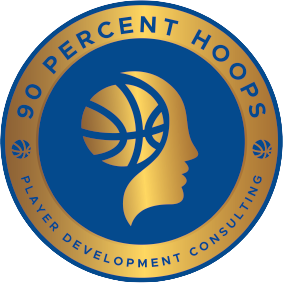You may be familiar with the cliché saying, “If you don’t love yourself then nobody will.” We have all heard and said it a million times whenever we come across someone lacking self-confidence. It’s a tiresome phrase but the thing about clichés is, there is always some truth involved with whatever they may be. Nobody should love you more than you love yourself. You must accept yourself and learn how to love yourself before you can be loved by another person.
It is the exact same thing for trust.
You cannot reasonably expect someone else to trust you if you don’t even trust yourself. Just like how it is with love, you cannot make someone love themselves and you cannot make someone trust themselves. Only you can build trust in yourself. I have talked about in some of my previous articles the importance of not becoming too consumed with what is going on externally that you become out of touch with what’s going on internally. When you don’t have trust in others and/or are around people who don’t value trust, you start to become out of touch with the trust you have in yourself. So many people are either too quick to trust another person or are too afraid of trusting anyone. Trust can be completely in our control and not just something that’s up to other people. We shouldn’t let others determine the trust we can build for ourselves.
Learning how to trust yourself is a major step in developing as an individual and taking complete control of your life. It can be very difficult to learn how to trust somebody else, but not trusting others really is a cover up for deeper issues that are going on internally. If you have difficulty placing trust in others, the first thing you should do is a self-evaluation to see if you truly trust yourself first and foremost. You will never be able to fully trust anyone if you don’t learn how to trust yourself. Learning to trust yourself can greatly improve your decision-making ability, self-confidence, and ability to problem solve while also greatly reducing your insecurities. When you lack trust in yourself, you give power to your insecurities. Insecurities can cripple your confidence if you don’t trust yourself to work through them. Your insecurities will prevent you from ever reaching new heights in your personal/professional life, if you don’t face them head on and learn to live with them or overcome them.
When you trust yourself your will-power and resolve is greatly increased. Trust in yourself allows you to dig deep into your inner-strength which helps you work your way through difficulty and unfamiliarity. When we face uncertainty we tell ourselves to “stay strong”, but that is meaningless without trust. Staying strong only works if you have trust to keep that strength intact and implement it when it’s needed. This is why people fear uncertainty, because they don’t trust themselves to be able to adapt. Just think about it for a second. You should never fear unfamiliarity because you deal with it every single day of your life. Everyone has also failed at something in their life. If you have ever made through an unfamiliar situation/circumstance or overcame failure, you should have full trust in yourself. If you have done it before there’s no reason you cannot do it again. Nobody can predict the future yet alone what will happen tomorrow. Every single day of your life, you have woken up and not known exactly what you would be dealing with that day. But did you make it through? You sure did. Knowing this you should never fear uncertainty. Why worry about the uncertainty you are going to face down the line in a few years, when you have to get through the uncertainty of today. You’ve made it this far dealing with uncertainty every single day, so trust yourself that you can find comfort even if you are in a time of uncertainty in your life.
You will continue to be presented with many challenges that come your way but if you trust yourself, you will have no difficulty embracing those challenges and powering through them. Trusting yourself is about knowing. You have to know yourself to build real trust and that includes relying on your knowledge and past experiences to help guide you through the uncertainty that is the future. Those who don’t trust themselves, simply hope for the best and think that that will be enough. They are fine letting circumstances and things they cannot control have power over their lives. When you don’t trust yourself, you give away some control in your life just like how it is with insecurities. If you don’t trust yourself then your trust is placed in things outside of your control. You start to value emotions and the opinions of others rather than your own, because you don’t trust yourself to do the right thing or make the right decisions.
Trust is about knowing. If you trust someone else to do something, you know that they are going to do it. If they violate that trust and don’t do it than you know that you cannot give away trust to that person again. Whether someone else violates or upholds that trust, it is still about knowing. A key component of trusting yourself is about knowing who you are. If you have a good understanding of who you are, you know what is good for you and what is not, who you need to be around and who you should avoid, what motivates/inspires you, and what you excel in as well as areas for improvement. All these things help determine your identity. If you truly trust yourself, you will always stay true to your identity. If you don’t trust yourself, it opens the door for allowing outside opinion to determine your identity for you. You cannot make your own decisions, solve your own problems or simply feel confident in yourself if your identity is not truly and solely exclusive to you and your own life. Never let someone else dictate who you are and who you want to be.
You may not even know whether or not if you trust yourself. In addition to what I have already revealed, I will provide you with some signs that will help you determine how much trust you have in yourself, if any. Then I will offer up some solutions on how you can learn to trust yourself more.
You don’t truly trust yourself if:
You do not trust others – It’s not that you think you can do everything better than someone else or you only trust yourself to do it right. You might say something like, “I don’t trust that person to do it, I would rather just do it myself.” It is a common misconception that if you don’t trust others that means you really only trust yourself. In fact, it is the opposite. If you don’t give trust, then that means you don’t have any. You cannot give what you do not have. You hear in music and pop culture that you “should only trust yourself.” I say that you should be patient in handing out trust, but trust is absolutely required for getting whatever it is you want out of life. You can only do so much by yourself and will ultimately need others to help you out sometimes. If you do not trust anyone, you likely are skeptical of others and do not even offer the opportunity for others to earn your trust. To earn trust, you must give it away sometimes. You probably look for the slightest excuse to deem somebody else as untrustworthy or label someone as untrustworthy before you even get to know them. You let past experiences of mistrust prevent you from ever putting your trust into someone else.
The way that trust is naturally built between two people has a lot to do with their history. You are far more likely to trust a friend you have known for 9 years rather than someone you met 9 days ago. Trust takes time and it is built in the small moments. You also may be hesitant to tell others about their goals and aspirations. You are hesitant not for the fact that you don’t want other people to know about your goals and aspirations, you should want others to know just in case they might be able to help you out. The real reason you are hesitant to tell others about what you hope to accomplish in the future is because you don’t trust yourself to actually do what you say. You are scared to face that person you told about your goals because in three years when they ask, you don’t want to tell them you haven’t made any progress or haven’t done what you initially set out to do. You are unwilling to confide in and be open with others because your insecurities loom so large. It all stems from a lack of trust in yourself.
You are scared to try new things/step out of your comfort zone – You cannot try everything out there, but if you are unwilling to try new ways of thinking, adopting new attitudes and new perspectives, and only stick to what you know then you don’t have full trust in yourself. If you are unwilling to try new things or new ways of looking at things, that means you are afraid to deal with the potential fall out that comes with trying new things. When you try something new or step out of your comfort zone you open yourself up to discomfort, frustration. Nobody likes those feelings, but you also shouldn’t avoid them entirely. Those feelings are only temporary and will serve as great insight to help you learn more about yourself. Like I was saying earlier in this article, you deal with uncertainty every day and get through it, you should have that same mentality when it comes to trying new things. Part of learning how to trust yourself is showing yourself that you can step out of your comfort zone. This allows you to be opened up to new possibilities. When you are doing something new/unfamiliar, it may not make complete sense at first, but you have to trust yourself to figure it out or at least learn from it. You cannot grow yourself if you do not stretch beyond whatever your current capabilities are.
You judge other people/compare yourself to other people – I have to make an important clarification, it’s great to talk about others only when doing so in a positive light. You should never judge or gossip about other people and their business. A sign of not trusting yourself only applies if you judge others or talk about them in an unfavorable way. Talking about other people and their problems takes you away from focusing on yourself and your own problems. If you are worried about someone else that should serve as a signal that you have lost some control in your life. What other people do is their decision and you shouldn’t try to live someone else’s life for them. A significant aspect of this is following others instead of yourself. If you follow the actions and attitudes of those around you, then you lack the trust in yourself to make your own decisions because you need their validation and recognition. Life is not a popularity contest, you shouldn’t judge yourself based on how well liked you are by your peers. When you are on your death bed you are not going to wish you had followed the lead of others more and tried to be more liked by others. It’s likely that you will say the opposite that you wish you had followed the crowd less and done more on your own. The amount in which you are liked by others is totally insignificant compared to the liking you need to have for yourself. You can’t be anyone else but yourself, so focus on bettering yourself and looking internally rather than comparing yourself to others. It is impossible to have trust in yourself if you are constantly looking at others for validation.
How you can learn to trust yourself:
Positive self-talk
You have to examine the way you talk to yourself.What do you say to yourself when you fail or make a mistake? Do you judge yourself hard or encourage yourself to keep going? If you don’t trust yourself it’s likely that you harshly judge yourself for every mistake you commit. The words that run through your mind need to be ones of positivity and encouragement. Your thoughts ultimately determine the direction of your life, you cannot change anything about yourself until you make a positive change to towards your thoughts. What you tell yourself is what you believe about yourself. Your thoughts determine who you are and the direction of your life. If you want to make any improvement in your life, start by looking closely at the way you talk to yourself. If you think about negativity and have pessimistic mindset, then that will be reflected in your personality. You can change the direction of your life overnight simply by deciding to think positively and optimistically. The first step to take to think positive thoughts is by thinking about all the good things in your life, all the things you are happy that you have in life. Just look around, I am sure that you can find a few things. Next, you need to remove all complaints out of your mind. Whenever you feel the need to complain, put a spin on it and think about the positive. Instead of complaining that you got one and a half espresso shots instead of two, just be thankful that you have an overpriced cup of coffee to drink. A lot of people don’t have that luxury.
Failure is inevitable in life, no matter how much you try to avoid it, you will be confronted with it at some point. Instead of beating yourself up and quitting, encourage yourself, commend yourself for trying and focus on what you learned, not what you lost. There is a silver lining in every situation, no matter how dark things may seem. Many people fail to recognize that silver lining since they are consumed with the negative outcomes. Focusing on the negative leads to discouragement. It is hard to trust yourself if you are always feeling discouraged. The worst thing that you can do is let other opinions influence the voice inside of your head. People may tell you that you are not good enough or not fully capable but only you can believe and accept that for yourself. People can say whatever they want but they can’t force you to believe something about yourself. Stay in control of your life by valuing your own opinion 100% of the time. The words you say to yourself help determine the belief that you have in yourself. If you believe that you are capable then nobody else can stop you. You should know yourself better than anyone else knows you, use that understanding to develop belief. That is how you start to trust yourself. Believability is a huge component of trust. You wouldn’t trust someone that you don’t believe in, so let yourself know that you believe. If you are not exactly where you want to be, you have to put your imagination to work. Visualize the person you want to be, not the occupation or status or money that you want but who YOU want to be. What do you want to be known for, your attitudes, your intentions, the way you carry yourself, how you would describe yourself to others. At some point in your life you should want to be the best possible version of yourself. Think about what that looks like and flesh out all the details in your mind. Once you have that vision for yourself, you automatically establish a direction or a purpose for who you want to be. Since that is the direction you want to take, your short term actions will start to follow suit and you will almost instantly be on your way to becoming that person. You can incorporate those future values and vision of yourself immediately into your life today.
Reflection
Good reflection allows you to honestly look at yourself and your current situation. It allows you to review your thoughts, attitudes, and actions. When you understand these things it allows you have more clarity on how to improve. In sports, coaches call timeout to let their team have a break, provide feedback on their performance, and implement strategies to help them moving forward. If a coach never called timeout, then their team wouldn’t have a chance to assess their performance and know how to improve. It is the same thing in your personal life, taking a timeout, or moment to reflect, allows you to evaluate your own performance in life and what you can do to be better. This is the only way that you can make progress in your personal development. Reflection allows you to review your past, capture how you feel in the moment, and outline your vision for the future. Reflection builds trust in yourself because it allows you to identify the mistakes you have made. The best way to confront a mistake you have made or a deep rooted insecurity is by facing it head on. Your insecurities are not going to hide themselves or disappear magically. They will continue to rear their ugly head if you do not try to take them out at their source. Every day you are constantly faced with new challenges and new responsibilities. Taking time to pause and reflect prevents you from feeling overwhelmed and allows you to confront and address each issue as it arises, instead of putting it off and trying to forget about it. The more you put it off the harder it will be to overcome. When trying to build trust in yourself, you have to think critically and objectively about your own life. You cannot try to take everything at face value, but get to the root cause. Lack of trust in yourself could be the result of a lack of self-confidence. In order to make progress you have to look at the root causes of your lack of confidence. Maybe you are overvaluing the opinions of others or you lack appreciation and gratitude. Just like how it is with building trust with others, there is a lot that goes into it and there are required steps that must be fulfilled in order to have that trust in someone else. You don’t trust someone right away. You aren’t going to trust yourself right away either. By consistently reflecting and getting to the root of your problems and insecurities, you will build trust over time. You don’t have to focus solely on building trust, but developing other areas of your life will allow you to build more trust in yourself.
Stop fearing judgement
You will never be able to trust yourself if you are unwilling to listen to your own voice and make decisions for yourself. Everyone has goals and aspirations that they would like to achieve in life, the only difference between the ones who make it happen and the ones who don’t, is courage. The courage to drown out the external noise that is the opinions of others, and focus on their goal. If you believe in something and think that you are capable of getting it done, then you should go for it without fearing the judgement of others. You don’t need anyone else’s approval in life, only you know what is right for yourself. Other people may think they know what is right for you and will appear to be on your side and acting in your best interest. Really though, they have ulterior motives and are projecting their own thoughts and opinions onto you. They don’t really think about what’s best for you, they think about what is best for them if they were in your situation. All humans have selfish tendencies and we tend to involve ourselves in situations we have no business being involved in. We tend to disregard empathy and try to make decisions for other people based on what we want, not what the other person wants. If you don’t trust yourself, it means that the opinions of others are holding you back from making the decisions you want to make and doing what is best for yourself. A great way to combat this is by realizing that you cannot please everyone. No matter what you do, you will always have supporters and naysayers. Someone will always take your side and someone will always go against you. So why even try to cater to others? The most important thing is doing what is best for yourself and making your own decisions based on what you know and how you feel. When you don’t fear the judgement of others, you aren’t afraid to try new things, or step out of your comfort zone, or take action on something you have always wanted. You don’t have to answer to anyone in your life except yourself. You can never have real trust in yourself if you are adhering to the expectations that others place on yourself. Only you can establish the expectations for your own life. Trust is formed when you hold yourself accountable based on the guidelines and expectations that you set out for yourself and live them out daily. Once you start living your life on your own terms, you start to believe in yourself, and with belief comes trust.
Be optimistic
It’s a real challenge to have trust in yourself if you have a negative outlook towards life. Having a pessimistic outlook on life will rob you of happiness. When something is wrong in your life, you shouldn’t expect it to last forever. Storms never last but they can take you down if you aren’t strong enough to make it through. Many people have very grim outlooks on their life, they don’t expect things to improve even though they always do. That is a sign of serious lack of trust in yourself. You don’t think things will get better and you don’t trust yourself to make them better. Part of being optimistic is trusting yourself to improve and make your life better. If you only think that bad things are going to happen to you, you will have no motivation to try and make improvements in your life. When you possess optimism, you look forward to each day and the unique challenges within that day. You feel good about yourself and your ability to make the most out of that day. That feeling breeds trust, if you feel good about the day and the future ahead you will be much more confident in yourself and ability to get things done. If you were working with someone else and placed trust in them to accomplish a certain task, you wouldn’t tell them that you don’t believe in them or you don’t think they can do it. This would completely undermine all the trust that you have in that person. They would have no motivation to successfully accomplish the task because the one who gave it to them doesn’t support them. If you have a pessimistic outlook on life you are undermining the trust you have in yourself. There is no motivation to make the most out of each day if you don’t support yourself to actually go do it. By always putting a positive spin on things you allow yourself to see the possibilities. When you understand the possibilities it allows you to be hopeful. A key aspect of hope is believing, and as you should know by now, belief leads to trust.
Focus on your strengths
Just like you would only trust someone you know, in order to trust yourself you have to truly know yourself. If you truly know yourself, you know your strengths and weaknesses, you know what things you are good at and how you can use that to your advantage. A sign of people who don’t trust themselves is they constantly try to overcome their weaknesses instead of doubling down on their strengths. Trying to always overcompensate for your weaknesses is a sign of insecurity. You will also always be in an uphill battle. You don’t want others to know what your weaknesses are, so you try to make up for it by working on your weaknesses. This causes you to work harder than you need to and you will stress yourself out in the process. The way you become proficient in something is by recognizing your strengths and working hard to make them even stronger. Most people trust what they know, and if you know yourself you should know what you are good at. Don’t be afraid to go all in on your strengths because the ultimate goal of life is to do something that you both enjoy and are good at. Focusing on your strengths will give you the confidence you need to trust yourself. If you shoot 500 free throws every day, you are going to feel confident about your ability to make them when you get to the game. You aren’t afraid to go to the foul line because you trust yourself to make them. Trust comes with experience and the more experiences you gain the more trust you will build.
The Rolling J / Jonathan McClure
Previous post: https://therollingj.net/how-negative-experiences-can-lead-to-an-overall-positive-experience/














One thought on “THE ULTIMATE GUIDE TO LEARN HOW TO TRUST YOURSELF”